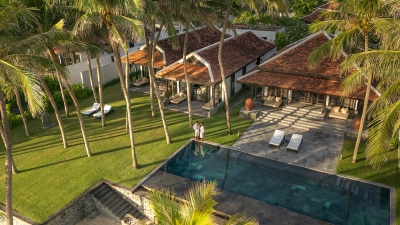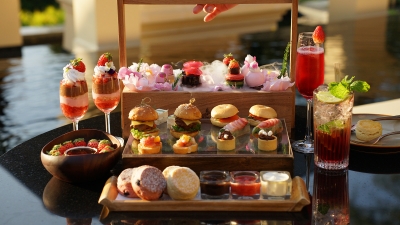Boasting a rich history intertwined with the opium trade and international intrigue, the Golden Triangle is deeply fascinating place. Beneath its tumultuous past, however, lies a hidden gem that awaits curious travellers — a region with a wealth of cultural and natural diversity where the nations and Thailand, Laos and Myanmar converge. “For those who venture into its heart, the Golden Triangle is surprisingly serene and scenic, allowing easy access into its mountainous folds and riverine landscapes,” shares Paweena Waraha, Camp Manager, Four Seasons Tented Camp Golden Triangle.
Opium Trade
Through the 19th century and up until a few decades ago, the Golden Triangle was synonymous with the cultivation of opium poppies. Indigenous communities initially grew opium for medicinal and ritual purposes, but this cultivation was quickly directed by colonial powers in the region. “During the latter part of the 19th century, European powers, such as the British in India and the French in Indochina, played a significant role in fostering opium cultivation, which was then shipped across to China for trade,” she recounts. In the aftermath of World War II, various insurgent groups embroiled in conflicts – such as the Chinese Civil War and the First Indochina War – hijacked the trade for their own vested interests. In fact, by the 1950s and through much of the Vietnam War, the Golden Triangle had emerged as the single biggest source of international heroin. “Efforts to combat drug production have been ongoing since the 1970s, with various governments and international organisations implementing programs and activities aimed at reducing cultivation and trafficking,” says Waraha.
Royal Projects and the Legacy of King Bhumibol Adulyadej
One of the most remarkable aspects of the Golden Triangle has been its recent transformation into a hub for agriculture and tourism. The late King Bhumibol Adulyadej, also known as King Rama IX, and his Royal Projects initiative were the primary catalysts for this change in pivoting from poppy cultivation to alternative means of livelihood. For the hill tribes of northern Thailand and especially in the Golden Triangle, King Bhumibol is seen as the father of sustainable development and the well-being of the people here. Eco-tourism and horticulture are now deeply ingrained within these communities and the Camp has partnered with both the Royal Projects as well as with local villages to promote sustainable practices.
- Doi Tung Royal Villa: A relic from an era past in Chiang Rai, this beautifully landscaped villa once served as the residence of King Bhumibol and Queen Sirikit. Visitors can explore the splendid Royal Flower Garden, and the Mae Fah Luang Art and Culture Park.
- Doi Tung Development Project: This showcase of sustainable agriculture includes coffee plantations, fruit orchards, and handicraft workshops. “Guided tours, where guests can learn how the various crops are grown organically, and observing local artisans at work, can be arranged by our Camp Guides,” she shares. At the Camp, guests get a first-hand taste of a special selection of Royal Projects coffee and teas grown exclusively for Four Seasons Resorts Thailand. The curated wine tasting experience at the camp, with its pairings of dried fruits such as strawberry, mango, and Phule pineapple also showcase produce from the Royal Project Foundation.
- Hall of Opium Museum: The wonderful museum dedicated to the troubled past of the region is certainly a must-visit. With interactive displays and multimedia presentations the museum offers a crucial understanding of the effects of opium and the efforts to combat its production in the region.
“The legacy of King Bhumibol lives on through the continued success of these Royal Projects, which have not only improved the livelihoods of the local population but have also contributed to the preservation of the region's natural beauty,” says Waraha.
Transition to Tourism
Beyond the poppy cultivation, however, is a spectacularly scenic landscape with a mosaic of hill and lowland tribal communities that have lived here for centuries. These indigenous cultures have survived the opium trade and thrive today as self-sustaining villages across the region. “Offering travellers an insight into their unique way of life, the Camp is committed to outreach tours and immersive experiences that benefit the locals and bring valuable income to the local villages,” she adds.
Exploring the natural beauty of the region is another reason to visit – with its rugged terrain, dense tropical jungles, and mist-covered mountains, there is jaw-dropping scenery at every turn of the bend. Providing the setting for outdoor enthusiasts, the Camp is a great venue for bird-watchers and hikers. With wonderful trails both in and around the Camp, guests who love the outdoors will be in their element here. An essential part of the travel experience to the region, boat excursions aboard the Camp’s own wooden long-tail boat allows for a non-invasive glimpse into the traditional riverine communities that flank the Ruak and Mekong Rivers.
The local cuisines of the Golden Triangle are in themselves very fascinating for their fusion of flavours that draw from the cuisines of Thailand, Laos, and Myanmar. “An excursion by boat and then tuktuk through border town of Mae Sai with a local guide can be especially rewarding for foodies, with so many local snacks on offer at the local market there,” Waraha insists.
Heritage sites and temples dot the river banks here, with highlights such as the ancient city of Chiang Saen with its historic ruins and temples. Visitors may visit the stunning Wat Phra That Doi Wao at Mae Sai by boat where the gilded pagoda and panoramic views over into Myanmar are a sight to behold.
“The Golden Triangle is a compelling place, with its stories intertwined within the landscape,” she observes. “Those with a spirit of adventure and a thirst for exploration will be thrilled to venture beyond the obvious and connect with the destination.” And Four Seasons Tented Camp opens the door to this vibrant region with bucket-list experiences and memories to be created – with a little inspiration from its Camp Guides.

Bangkok, 10330
Thailand
Four Seasons Tented Camp Golden Triangle, Thailand
PRESS KIT












